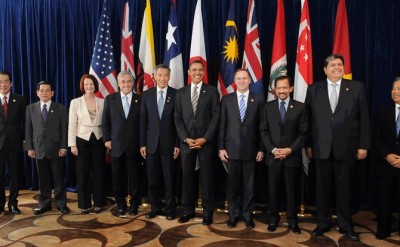You may never have heard of the Trans-Pacific Partnership, (TPP) but the impact of the trade deal on the safety of America’s food could be significant.
The potential deal between the United States and Pacific Rim nations has been so closely guarded that Congress has reportedly been able to garner only a few details about the agreement.
If the 12-nation Trans-Pacific Partnership trade agreement is approved, Americans may soon be dining on Asian chicken, seafood and beef which do not even come close to achieving United States Food and Drug Administration (FDA) standards. The federal agency would reportedly be powerless to ban imports based upon a lack of food safety attributes. That’s because under the trade deal, countries would be bound by the deal’s language instead of their own regulations.
The Obama administration wants to see the trade deal finalized by the end of the year, even fast-tracked, but there is opposition in Congress from Obama’s own party.
It would be the biggest trade deal with the 1995 World Trade Organization.
“Some information has come out, but this is politically charged and there’s been more secrecy around the TPP than in past agreements,” Maria Toyoda, a professor of political science and a trade expert at Villanova University, told CNBC. “Because it’s so consequential and would have such a major impact, many of the parties want to keep the details a secret,” Toyoda said. “People remember the riots in Seattle in 1999 over the WTO and how that deal came under scrutiny afterward. There’s fear something like that could happen again.”
Discover one family’s experiment to consume only what was local, used, homegrown, or homemade
This summer, the United States and the European Union (EU) launched negotiations on what is called the Transatlantic Trade and Investment Partnership (TTIP) agreement. That agreement, too, would force the US to abide by the language of the agreement and not by American regulations.
Americans who who do not believe the USDA, FDA and EPA are adequately protecting Americans from unsafe food surely will not feel comfortable further lowering food safety standards.
If published details of the two trade deals are accurate, the concept of the lowest common denominator could soon reign supreme in the agriculture industry.
“So for instance, say Vietnam allows higher residues of veterinary antibiotics in seafood than the U.S. allows, and Vietnam and the US both sign on to the TPP,” Alternet reported. “As a trade partner, the US could be forced to lower its standards to allow for imports of seafood from Vietnam – or face a lawsuit by the seafood exporter for depriving the company of future sales of its products in the US.”
While such a scenario may seem shocking, a precedent has already been set. In 2005 the United States government was sued by the Canadian Cattlemen for fair trade. Provisions in the North American Free Trade Act – NAFTA — gave standing for the civil action. The lawsuit stemmed from a ban of Canadian Cattle after a case of mad cow disease. Although the United States won the case, millions of taxpayer dollars were spent to accomplish the victory.
“This is an area where I believe that trade is trumping public health in a very significant way,” Rep. Rosa DeLauro (D-Conn.) told Politico. “This deal will lead to an influx of seafood imports from Asia, and we should therefore enhance funding for food safety at the FDA,” she said. “We’re at a government shutdown here at the moment. They’ve been trying to starve FDA of resources at the best of times.”
Some feel that the Trans-Pacific Partnership is nothing more than a back-door attempt to push genetically modified foods into countries which want to ban such products, or mandate GMO labeling. As previously reported by Off The Grid News, the European Union is far less open to allowing the consumption of genetically engineered crops than is America.
If the massive impact of the TPP and TTIP on future agricultural policy in the United States was not a big enough problem to worry about, the details of the second half of the agreement will definitely give Americans’ pause. The policies included in the trade agreement may impact economic markets, Internet freedom, health care, and environmental sustainability as well.
The 12 countries involved in the proposed Pacific deal are the United States, Japan, Vietnam, Singapore, Brunei, Malaysia, Australia, New Zealand, Chile, Peru, Mexico and Canada.
 Off The Grid News Better Ideas For Off The Grid Living
Off The Grid News Better Ideas For Off The Grid Living





